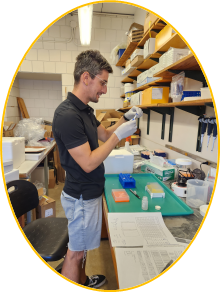
Marine seagrasses are submerged flowering plants that form essential underwater meadows, fostering diverse ecosystems and providing a habitat for marine life. Our first Promega qPCR Grant winner and marine ecologist, Dr. Agustín Moreira-Saporiti, plans to continue adding to a fascinating body of work aimed at understanding flowering in marine seagrasses.
Dr. Moreira-Saporiti began his journey into marine plant ecology at the University of Vigo, Spain, where he earned a bachelor’s degree in marine sciences. He then went on to complete a master’s degree at the University of Bremen (Germany) where his thesis focused the ecology of seagrasses in Zanzibar, Tanzania. His passion for marine botany led him down a deeper exploration of marine plants, unraveling the intricate web of ecosystem processes within seagrasses.
Dr. Moreira-Saporiti is currently a Postdoctoral Research at the Marine Biological Laboratory (MBL) in Woods Hole, MA. His current projects focus on the genetic mechanisms underpinning the flowering process in seagrass, and it was this research that led him to apply for the Promega qPCR grant. The culmination of his academic training shaped his current project: understanding the flowering processes of Zostera marina, the most widespread seagrass species in the world. Trained primarily in ecology, he is excited to delve into a novel molecular biology approach in the conservation of marine seagrasses. His plans with the funds from the qPCR Grant are two-fold: 1) he aims to uncover novel connections between molecular signatures, plant flowering and the changing environment and 2) he will begin working toward a fully annotated Zostera genome.
When asked what inspired his research, Dr. Moreira-Saporiti explained that marine plant ecosystems are a continuous source of interest. He is motivated by the desire to understand the intricacies of marine ecosystems and seeks to apply that knowledge to make a difference in marine conservation. He hopes his projects can contribute to tangible outcomes like ecosystem management or species conservation. He also attributes his current trajectory to one of his most impactful mentors, Dr. Mirta Teichberg, an associate research scientist at MBL. Through this mentorship, Moreira-Saporiti learned the art of fostering collaboration and understanding that researchers are people first. He hopes to emulate these characteristics as a future leader in the field.

Reflecting on his career so far, Dr. Moreira-Saporiti offers advice to his younger self: “Read a lot, study data analysis and always be curious and critical.”
Learn more about the Promega qPCR Grant here!
Anna Bennett
Latest posts by Anna Bennett (see all)
- No More Dead Ends: Improving Legionella Testing with Viability qPCR - March 18, 2025
- Strengthening Water Safety Measures with Advanced Detection - February 18, 2025
- Understanding and Combating Legionella in Water Systems with Viability PCR - January 21, 2025
